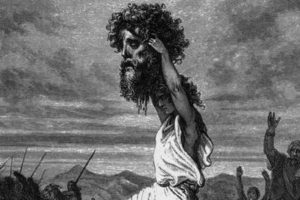As I have pointed out in previous writings, there is a huge difference between Christian information and Christian knowledge. For while the former bears little on our behavior, the latter can determine not only the way we think, but also the way we act and make decisions.
Paul
The apostle Paul refers to this kind of knowledge when he writes:
But we speak the wisdom of God in a mystery, the hidden wisdom which God ordained before the ages for our glory, which none of the rulers of this age knew; for had they known, they would not have crucified the Lord of glory” (1 Cor. 2:7–8).
Here Paul gives an example of the correlation between knowing and acting. He tells us that living knowledge can determine what a person will or will not do: “… for had they known,” he insists, “they would not have crucified the Lord of glory”. Notice the absoluteness of Paul’s statement. He doesn’t say: “… for had they known, maybe they would not have crucified the Lord of glory”, but rather, “had they known, they would not have crucified the Lord of glory”. In Paul’s mind all doubts were done with. There was certainty and utter assurance.
Now one may ask: How could the apostle be so sure? The answer is based on Paul’s understanding of genuine Christian knowledge. He knew that the knowledge proceeding from revelations was an efficient cause. A cause is called efficient when the entity “A” always entails the entity “B”.
Jesus
In the Gospel of John we read something similar. Speaking to the woman at the well Jesus affirms:
If you knew the gift of God, and who it is who says to you, ‘Give Me a drink,’ you would have asked Him, and He would have given you living water” (John 4:7–10).
Here again we have certitude. Jesus doesn’t say, “If you knew… you might have asked”, but rather, “If you knew… you would have asked”. According to Jesus the living knowledge the Scripture refers to is apt to determine a specific course of conduct—in this case, the prayer of faith.
The person who truly knows will surely do or not do. His knowledge will not only condition his behavior but also determine it. Some of you might have read my post on knowledge and faith (here is the link). As much as living faith secures works, living knowledge brings them forth.
Solomon
The author of proverbs had understood the same correlation. He writes: “He who has knowledge spares his words, …” (Proverb 17:27). Genuine Christian knowledge will always affect our way of acting or reacting. Contrary to mere Christian information it bears on our behavior.
Actually what we are talking about is nothing very spiritual. It’s the way we live our everyday life. For instance, during the month of July you will see me water my plants quite often because I don’t want them to die, and I know they would die if I don’t water them. Therefore my knowledge obliges me to water them. Not only it conditions me, it actually determines what I will do.
Likewise I put gasoil in the diesel car I am using because I know gasoline would not work. And since I need to go somewhere my knowledge determines my action, that is, I put gasoil in the car every single time. Notice that I still have a free will, yet my knowledge determines a regular course of action.
Christian knowledge versus Christian information
When Paul writes: “And not only that, but we also glory in tribulations, knowing that tribulation produces patience” (Romans 5:3), he is testifying that the way he faced tribulation was the result of knowledge, i.e., the fruit of revelation.
James writes something similar when he says:
My brethren, count it all joy when you fall into various trials, knowing that the testing of your faith produces patience” (James 1:2,3).
This sort of living knowledge reaches deep into the heart. It affects the mind and opens the eyes. It leads us to new meditations and causes us to look at life differently.
Mere information could never have such an impact. A student can graduate from two Bible Schools; listen all the teachings Internet offers on Romans 5:3; read all the commentaries he can get on this specific verse; and yet continue to curse every tribulation coming his way.
When “knowledge” is detached from the breathing Spirit it is reduced to a dry skeleton which can make us believe we know, while sleeping on the pillow of deceptive ignorance. It is this sort of “knowledge” that puffs up the mind and chokes the heart.
James was careful to differentiate the wisdom coming from above from the wisdom coming from beneath. The same is to be applied to knowledge. How long are we going to idolize dead Christian information and sell it as if it would be the latest product of the evangelical world? “Let’s fill their head with information,” they say, “and let them be the leaders of God’s people”. What a tragedy!
May the God of our Lord Jesus Christ, the Father of glory, give unto us the Spirit of wisdom and revelation in the knowledge of Him, for this is our only hope.
If you think this post can help somebody else you can share it with the options presented bellow.













